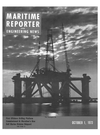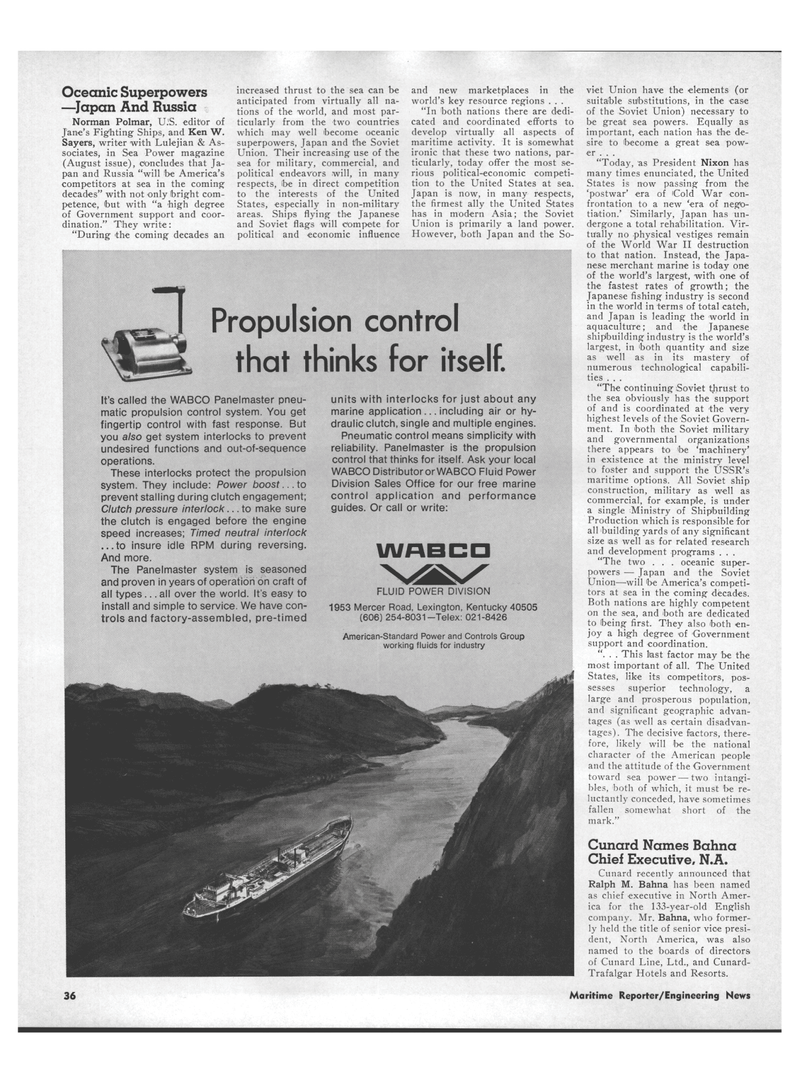
Page 34: of Maritime Reporter Magazine (October 1973)
Read this page in Pdf, Flash or Html5 edition of October 1973 Maritime Reporter Magazine
Oceanic Superpowers —Japan And Russia
Norman Polmar, U.'S. editor of
Jane's Fighting Ships, and Ken W.
Sayers, writer with Lulejian & As- sociates, in Sea Power magazine (August issue), concludes that Ja- pan and Russia "will be America's competitors at sea in the coming decades" with not only bright com- petence, but with "a high degree of Government support and coor- dination." They write: "During the coming decades an increased thrust to the sea can be anticipated from virtually all na- tions of the world, and most par- ticularly from the two countries which may well become oceanic superpowers, Japan and the Soviet
Union. Their increasing use of the sea for military, commercial, and political endeavors will, in many respects, be in direct competition to the interests of the United
States, especially in non-military areas. Ships flying the Japanese and Soviet flags will compete for political and economic influence and new marketplaces in the world's key resource regions . . . "In both nations there are dedi- cated and coordinated efforts to develop virtually all aspects of maritime activity. It is somewhat ironic that these two nations, par- ticularly, today offer the most se- rious political-economic competi- tion to the United States at sea.
Japan is now, in many respects, the firmest ally the United States has in modern Asia; the Soviet
Union is primarily a land power.
However, both Japan and the So- viet Union have the elements (or suitable substitutions, in the ease of the Soviet Union) necessary to be great sea powers. Equally as important, each nation has the de- sire to become a great sea pow- er .. . "Today, as President Nixon has many times enunciated, the United
States is now passing from the 'postwar' era of Cold War con- frontation to a new 'era of nego- tiation.' Similarly, Japan has un- dergone a total rehabilitation. Vir- tually no physical vestiges remain of the World War II destruction to that nation. Instead, the Japa- nese merchant marine is today one of the world's largest, with one of the fastest rates of growth; the
Japanese fishing industry is second in the world in terms of total catch, and Japan is leading the world in aquaculture; and the Japanese shipbuilding industry is the world's largest, in both quantity and size as well as in its mastery of numerous technological capabili- ties . . . "The continuing Soviet thrust to the sea obviously has the support of and is coordinated at the very highest levels of the Soviet Govern- ment. In both the Soviet military and governmental organizations there appears to be 'machinery' in existence at the ministry level to foster and support the USSR's maritime options. All Soviet ship construction, military as well as commercial, for example, is under a single Ministry of Shipbuilding
Production which is responsible for all building yards of any significant size las well as for related research and development programs . . . "The two . . . oceanic super- powers — Japan and the Soviet
Union—will 'be America's competi- tors at sea in the coming -decades.
Both nations are highly competent on the sea, and both are dedicated to being first. They also both en- joy a high degree of Government support and coordination. ". . . This liast factor may be the most important of all. The United
States, like its competitors, pos- sesses superior technology, a large and prosperous population, and significant geographic advan- tages (as well as certain disadvan- tages). The d-ecisive factors, there- fore, likely will be the national character of the American people and the attitude of the Government toward sea power—two intangi- bl es, both of which, it must be re- luctantly conceded, have sometimes fallen somewhat short of the mark."
Cunard Names Bahna
Chief Executive, N.A.
Cunard recently announced that
Ralph M. Bahna has been named as chief executive in North Amer- ica for the 133-year-old English company. Mr. Bahna, who former- ly held the title of senior vice presi- dent, North America, was also named to the boards of directors of Cunard Line, Ltd., and Cunard-
Trafalgar Hotels and Resorts.
Propulsion control that thinks for itself.
It's called the WABCO Panelmaster pneu- matic propulsion control system. You get fingertip control with fast response. But you also get system interlocks to prevent undesired functions and out-of-sequence operations.
These interlocks protect the propulsion system. They include: Power boost... to prevent stalling during clutch engagement;
Clutch pressure interlock... to make sure the clutch is engaged before the engine speed increases; Timed neutral interlock ...to insure idle RPM during reversing.
And more.
The Panelmaster system is seasoned and proven in years of operation on craft of all types... all over the world. It's easy to install and simple to service. We have con- trols and factory-assembled, pre-timed units with interlocks for just about any marine application ... including air or hy- draulic clutch, single and multiple engines.
Pneumatic control means simplicity with reliability. Panelmaster is the propulsion control that thinks for itself. Ask your local
WABCO Distributor or WABCO Fluid Power
Division Sales Office for our free marine control application and performance guides. Or call or write:
UUABCD
FLUID POWER DIVISION 1953 Mercer Road, Lexington, Kentucky 40505 (606) 254-8031-Telex: 021-8426
American-Standard Power and Controls Group working fluids for industry m H 36 Maritime Reporter/Engineering News

 33
33

 35
35
